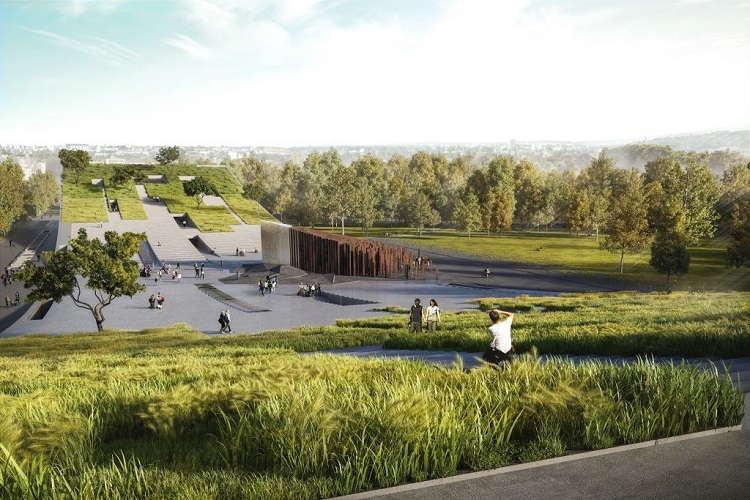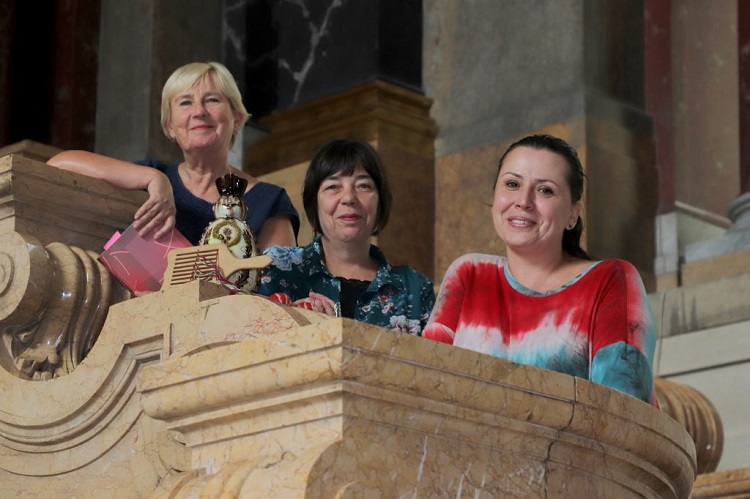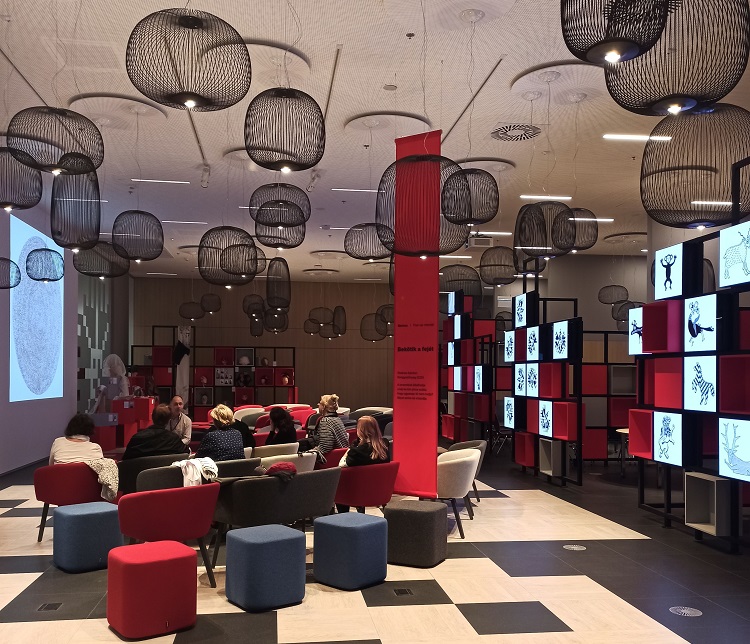
The Museum of Ethnography opened its doors to visitors in 2022 in a new, world-class building. The museum aims at organising new exhibitions and programmes, develop workshops, activities and lecture series for adults, the elderly, and people with disabilities.
New building – new challenges
We talked to Erika Koltay, museum educator at the Museum of Ethnography, about the results of their Erasmus+ project.
What motivated you to embark on this project?
The new building brought along a lot of changes and challenges. We started thinking about new communication and knowledge transfer strategies as soon as we saw the plans, as the huge building also called for a change of strategy. The move also required organisational restructuring. In the context of these challenges, we wanted to learn as much as possible about good practices and meet foreign partners. This is how the idea of the application was born.

Was this your first Erasmus+ application?
Yes, it was our first time. At the Museum of Ethnography, three of us worked on the project, we are all museum educators, but our areas of expertise are different. Judit Bartók-Lovas is a communication and PR specialist, Kata Bodnár is an archaeologist-historian, and I am an ethnographer-biologist. We formed a diverse team, which fortunately determined who would focus on what during the project.
What activities were achieved during the project?
We had previously conducted surveys, which revealed that it was mainly the adult population who participates in
museum pedagogical activities in a lower proportion.
This led us to look at the good practices of other countries, and on this basis, we selected the institutions we worked with for the project. During job shadowing type mobilities, we participated in professional consultations, general and thematic guided tours, and complex programmes. We also had the opportunity to learn about innovative methods and modern techniques.
We had professional contacts with 10-11 museums, but we also visited museums in our free time, so in total we visited more than 30 institutions in three countries. Due to the pandemic, the Swedish mobility could only take place virtually, which we were very afraid of initially, but we were pleasantly disappointed in the end. Virtual exhibition tours were organized for us by the colleagues, who were very kind and helpful.
What was the most memorable moment for you during your mobility?
When we went to the Estonian National Museum and noticed the dimensions of the building. The museum is located on the site of an old airport, which, similarly to our new museum, was also huge. We went there in the evening, before closing time – because we wanted to be prepared for the next day's meeting – and the museum was almost empty. Then we were overcome with fear of how we were going to fill our museum with people. The next day we went back with colleagues who led us into their workshop area and showed us their wonderful exhibitions. When we saw that the museum was full of visitors, as a result, the three of us was reassured. We knew that it would be up to us at the Museum of Ethnography to make it all work. We also got fantastic ideas for the use of space in the new building and for creating an interactive museum space.
It was also a great experience for me to visit the National Botanic Garden of Wales, which we included not only because I am a biologist, but also because the Museum of Ethnography moved to a greener environment, the City Park, and the designers created a large, green area on top of it, which is one of our future plans to transform into a museum garden.

What impact did the project have on the professional life of the Museum of Ethnography?
We have several programmes that we are introducing thanks to what we saw abroad. One of them is the volunteer programme that we saw in Cardiff: on exhibition days, volunteers turn up and talk to visitors providing information – more than what can be read in the exhibitions, and they also help with interpretation.
Our temporary exhibition "Angiosperm" has also recently opened, where we also tried to implement what we had seen in Wales. Our environmental awareness program based on intergenerational dialogue has also been implemented – due to its remarkable success, the one-off programme has now become a series of programmes. In Estonia, in the framework of a rehabilitation programme, an institute for the mentally ill patients involved patients in various programmes in the botanical garden. We are also applying what we saw here, but the details are still being worked out. Finally, we created MÉTA Square, which is the Museum's unique, interactive educational and community space, which includes a reading corner and an active relaxation area. In this regard, too, we saw exceptionally good examples abroad that we can incorporate.
What are you most proud of about the project?
First of all, the fact that it won the Award of Excellence, and secondly, I would like to highlight the development of the MÉTA Square, which I mentioned earlier. We see that it works well: it has become extremely popular not only among our visitors, but our colleagues also like it very much, they hold many lectures and meetings there.

Why would you recommend Erasmus+ to institutions with similar profiles?
It can be very inspiring when working professionally you see your ideas validated abroad or see good examples that you can incorporate. At the same time, we also make professional contacts and see the world. Broadening our horizons is particularly important these days. That is why I encourage everyone to apply.
What does winning the Excellence Award mean to you?
It confirms that we are going in the right direction, that the experiences we have gained is taking us in the right direction. It is also an inspiration to our colleagues: more people visit the blog and website and ask questions about the project. In short, the Award of Excellence made us more interesting for others.
|
Institution: Museum of Ethnography Project title: Preparatory Work for the New Museum of Ethnography's Adult Learning Strategy as Part of the Erasmus+ Project Measure: Mobility of adult education staff (KA1 ADU) Coordinators: Erika Koltay, Kata Bodnár, Judit Bartók-Lovas Project website: barka-hid-palya.neprajz.hu |
Zsuzsanna Karnuts-Takács
Tempus Public Foundation,
Directorate of Communication
Last modified: 19-12-2023















